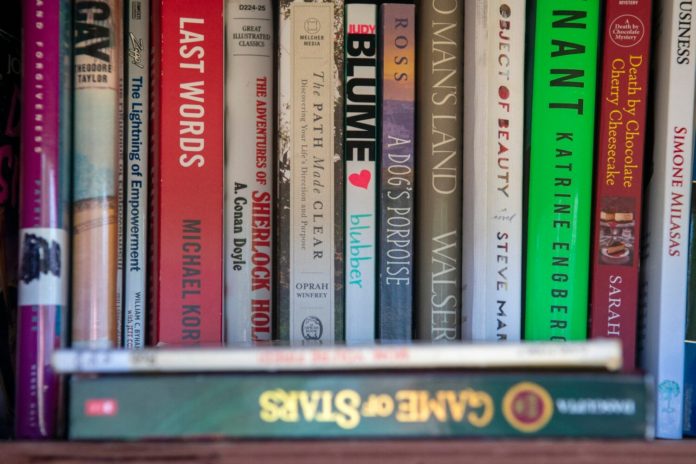
Books inside a Little Free Library on Friday at the McCall’s Park playground in Augusta. Joe Phelan/Kennebec Journal Buy this Photo
AUGUSTA — Rebecca Gay fills the Little Free Library in McCall’s Park at least twice a week.
Without fail, she has children run up to her, eager to see what she has dropped off.
“One time I was with my daughter and we dropped off her old cat books,” Gay said. “As we put them in, this little girl was standing at it, grabbed it and ran to her mom. My daughter said: ‘Did you see that? That’s how happy the book made me,’ and I said, ‘Yes, and now it’s doing it for someone else.’”
Literacy for ME, a Maine Department of Education program, has installed Little Free Library boxes in five locations across Augusta, and expects to have three more locations by the end of June, just in time for summer reading.
Little Free Library is a nonprofit organization, described as the “largest book-sharing program.” Anyone can build a free library, using one of the organization’s kits, or by building one from scratch.
The Literacy for ME program built its first four libraries with help from a local Boy Scout. The libraries that Literacy for ME has scattered throughout Augusta are taken out in the winter and replaced in late spring every year.
“It’s critical for kids to continue reading over the summer,” said Theresa Violette, Literacy for ME president and director of Title I & McKinney-Vento liaison in the Augusta Public Schools. “There is clear research showing kids who read who have higher academic achievement and kids who don’t, fall behind, in what’s called the ‘summer slide.’”
The federal McKinney-Vento Act provides urgently needed assistance to protect and improve the lives and safety of the homeless, with special emphasis on the elderly, handicapped and families with children.
Violette said she helped install the Little Free Libraries in Augusta during the summer of 2013. The popular libraries are now at five locations: Calumet Park, Cunningham Park, McCall’s Park and Williams Park, which are available 24 hours a day, seven days a week, and during building hours at the Augusta Adult Education office at 33 Union St.
The three new libraries are expected to be in the ground by June 30, according to Violette. They are planned for the Buker Community Center, the Webster Center and, during permitted hours, at the Augusta Food Bank on Mount Vernon Avenue.

A Little Free Library mounted on a fence around the swimming pool at the McCall’s Park playground in Augusta. Joe Phelan/Kennebec Journal Buy this Photo
Gay and other volunteers help ensure the libraries are stocked with books, and the Capital Area Technical Center helps keep the libraries in top condition.
Gay said she fills the libraries with books donated by her family members and retired teacher friends.
“We found over time they are readily used,” Violette said. “It made sense to utilize all of the resources in mind. When we go refill them in the parks, the kids come running up. It’s exciting.”
She said the thrill of seeing students and their parents grabbing books makes the program worth it.
The libraries operate under a “take a book and leave a book” philosophy. Violette said the Augusta libraries also donate books, along with classroom teachers who accumulate many books each year. She said the libraries are simply intended to encourage students and their parents to participate and read.
Jim Melcher, a professor of political science at the University of Maine at Farmington, installed the first Little Free Library in Augusta. He said his inspiration was connected to his being from Madison, Wisconsin, where the nonprofit organization began, and to his keeping track of books for his hobby of BookCrossing, the practice of leaving a book in a public place to be picked up and read by others, who then share the book in the same way.
The term comes from www.bookcrossing.com, a free, online book club that aims to “make the whole world a library.”

Jim Melcher’s Little Free Library at 44 Westwood Road in Augusta. Joe Phelan/Kennebec Journal Buy this Photo
Melcher said during the COVID-19 pandemic, he noticed students coming to his Little Free Library at 44 Westwood Road when other libraries were not open.
“I think it’s a great idea to encourage people to read and to think,” he said. “It gets people in the neighborhood walking around, and books in the hands of kids who may not get them otherwise.”
Violette said the literacy aspect the Little Free Library mission brings is “critical,” especially over the summer. He noted that this year has been unique with the coronavirus pandemic, but promoting reading “always” should be done.
Susan Bennett-Armistead, associate professor of literacy education at the University of Maine said students should be reading for at least 20 minutes each day to avoid a “summer slip.” The example she gave regarded exercise — if someone doesn’t work out at all over the summer, then has to spend their days in the fall, working out for six hours, they’ll be tired.
“In any given year, students are at-risk for losing up to a third of what they learned the previous year,” Bennett-Armistead said.
She said using resources such as libraries are “wonderful” to keep summer reading going, especially if a student has an interest on a topic they can learn more about through more books.
Bennett-Armistead said all forms of literacy — reading, writing, listening and speaking — are important, and encourages families to incorporate the 20 minutes into their day like they would brushing their teeth, and that goes for parents, too.
“A good indicator for students is how literate everyone is around them,” she said. “If parents are modeling by reading magazines or books or a newspaper, those are great things to recognize.”
Bennett-Armistead, like Violette, said reading in the summer is important, but especially important after the coronavirus pandemic.
“It’s easy to give them a pass after the year we had. The argument could be made, after the year we had, but you don’t want to have a hard year next year,” she said. “You don’t have to have lessons every day, but engage in reading with the family, do family read-aloud, have the chance to interact around children’s interests and give them the opportunity to have more literacy.”










Invalid username/password.
Please check your email to confirm and complete your registration.
Use the form below to reset your password. When you’ve submitted your account email, we will send an email with a reset code.